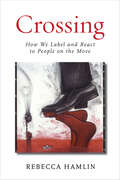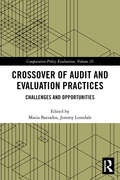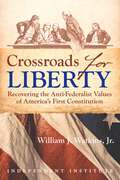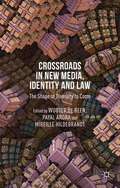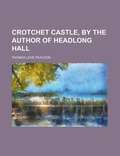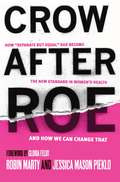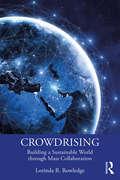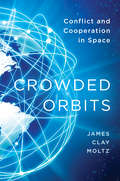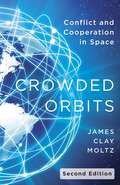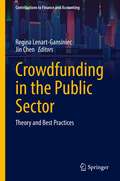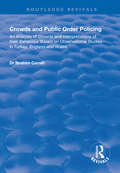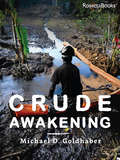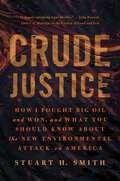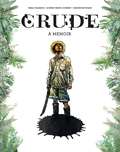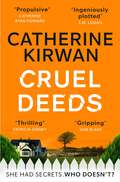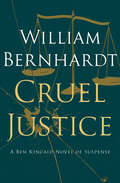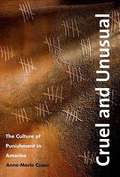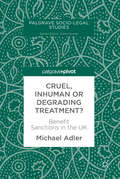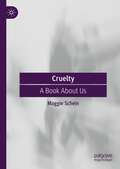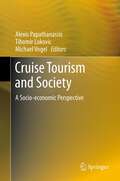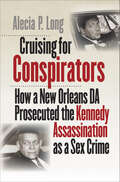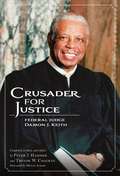- Table View
- List View
Crossing: How We Label and React to People on the Move
by Rebecca HamlinToday, the concept of "the refugee" as distinct from other migrants looms large. Immigration laws have developed to reinforce a dichotomy between those viewed as voluntary, often economically motivated, migrants who can be legitimately excluded by potential host states, and those viewed as forced, often politically motivated, refugees who should be let in. In Crossing, Rebecca Hamlin argues against advocacy positions that cling to this distinction. Everything we know about people who decide to move suggests that border crossing is far more complicated than any binary, or even a continuum, can encompass. Drawing on cases of various "border crises" across Europe, North America, South America, and the Middle East, Hamlin outlines major inconsistencies and faulty assumptions on which the binary relies. The migrant/refugee binary is not just an innocuous shorthand—indeed, its power stems from the way in which it is painted as apolitical. In truth, the binary is a dangerous legal fiction, politically constructed with the ultimate goal of making harsh border control measures more ethically palatable to the public. This book is a challenge to all those invested in the rights and study of migrants to move toward more equitable advocacy for all border crossers.
Crossover of Audit and Evaluation Practices: Challenges and Opportunities (Comparative Policy Evaluation)
by Maria Barrados Jeremy LonsdaleCrossover of Audit and Evaluation Practices brings together academic analysis with insights from practitioners to discuss the potential for collaboration in audit and evaluation practices between three professional disciplines. Clearly written and thoughtfully organized, this volume is structured in three parts to deal with theory, practice issues and how the practices have worked together. • Part One provides definitions of performance audit, internal audit and program evaluation. • Part Two addresses several challenges that professionals face in applying these standards and principles. • Part Three contains examples of organizational collaboration between the practices, how they have worked together and the lessons that were learned from that experience. Specific cases from the Government Accountability Office, and UNESCO, UNDP and Inter-Americas Development Bank illustrate what has worked or not and suggest reasons why. Crossover of Audit and Evaluation Practices offers even the most skilled and experienced professional insight on how to bridge some of the divides. It will help generate a better understanding of the activities and services that are either imposed on them or are freely available and help to stimulate their optimal use.
Crossover of Audit and Evaluation Practices: Challenges and Opportunities (Comparative Policy Evaluation)
by Maria Barrados Jeremy LonsdaleCrossover of Audit and Evaluation Practices brings together academic analysis with insights from practitioners to discuss the potential for collaboration in audit and evaluation practices between three professional disciplines. Clearly written and thoughtfully organized, this volume is structured in three parts to deal with theory, practice issues and how the practices have worked together.• Part One provides definitions of performance audit, internal audit and program evaluation.• Part Two addresses several challenges that professionals face in applying these standards and principles.• Part Three contains examples of organizational collaboration between the practices, how they have worked together and the lessons that were learned from that experience. Specific cases from the Government Accountability Office, and UNESCO, UNDP and Inter-Americas Development Bank illustrate what has worked or not and suggest reasons why.Crossover of Audit and Evaluation Practices offers even the most skilled and experienced professional insight on how to bridge some of the divides. It will help generate a better understanding of the activities and services that are either imposed on them or are freely available and help to stimulate their optimal use.
Crossroads for Liberty: Recovering the Anti-Federalist Values of America's First Constitution
by William J. Watkins Jr.What did the American Founders actually intend for the country, and does it even matter today? If America began as an idea, then what kind of idea?In a time of increasing turmoil over American history, politics, and society, Crossroads for Liberty: Recovering the Anti-Federalist Values of America&’s First Constitution takes a surprising and thought-provoking look at the American Revolution, the Articles of Confederation, and the Constitution, and asks what we can learn from them. Author William Watkins casts a critical eye on conventional wisdom about the Articles of Confederation, as he outlines the differences between that original U.S. governing document and the Constitution, which replaced it. He finds that the Articles protected individual liberty and community-centered government in ways that the looser language of the U.S. Constitution did not. Watkins draws from contemporary examples of bureaucratic overreach and expansion to support his argument—examples that were startlingly predicted by proponents of small government at the time of the Constitution&’s adoption. Along the way, he points back to the Articles and the values of the American Revolution as a framework for reimagining American politics to foster liberty and truly representative governance. Crossroads for Liberty arrives at an important time in American political life, and its reexamination of the American Founding presents a significant contribution to the story about America. Readers will come away with a greater understanding of current political and constitutional issues, as well as a new perspective on American history.
Crossroads in New Media, Identity and Law
by Mireille Hildebrandt Wouter De Been Payal AroraThis volume brings together a number of timely contributions at the nexus of new media, politics and law. The central intuition that ties these essays together is that information and communication technology, cultural identity, and legal and political institutions are spheres that co-evolve and interpenetrate in myriad ways. Discussing these shifting relationships, the contributions all probe the question of what shape diversity will take as a result of the changes in the way we communicate and spread information: that is, are we heading to the disintegration and fragmentation of national and cultural identity, or is society moving towards more consolidation, standardization and centralization at a transnational level? In an age of digitization and globalization, this book addresses the question of whether this calls for a new civility fit for the 21st century.
Crotchet Castle
by Thomas Love PeacockCrotchet Castle (1831), his sixth novel, contains all the humour and social satire for which Peacock is famous. Its lively farce is more ambitious than that of the earlier works in its range of cultural and intellectual targets, including progressivism, dogmatism, liberalism, sexism, mass education and the idiocies of the learned. The book constitutes an artistic, political and philosophical miscellany of sorts, thematically unified in its satirical emphasis on folly and dispute – and on the folly of dispute itself.
Crow After Roe
by Robin Marty Jessica Mason Pieklo2013 will mark the fortieth anniversary of Roe v. Wade, one of the most divisive rulings ever to shape American politics. In recent years, attempts to overturn Roe v. Wade have reached a fevered pitch. Since 2010 hundreds of bills banning or creating roadblocks to abortion access, contraception, and basic women's health have been proposed across the United States, with nearly one hundred new laws going into effect. The goal is to create a law that will eventually be brought before the most conservative Supreme Court ever to occupy the bench, in order to overturn Roe v. Wade.Crow After Roe: How "Separate But Equal" Has Become the New Standard In Women's Health And How We Can Change That takes a look at twelve states that since 2010 have each passed a different anti-abortion or anti-women's health law, and how each law is explicitly written to provoke a repeal of Roe v. Wade. The book will detail not just the history of the laws in question, but how they challenge Roe v. Wade and create a reproductive health care system that puts women-especially poor, rural, or those of color-into a separate class with fewer choices or control.Robin Marty is RH Reality Check's senior political reporter, focusing primarily on state legislation restricting women's reproductive rights. Her political, women's rights, and reproductive articles have appeared in Ms. magazine, Truthout, AlterNet, and BlogHer.Jessica Mason Pieklo is the assistant director of the Health Law Institute at Hamline Law School in St. Paul, Minnesota. She covers law and politics at Care2.com and RH Reality Check. Her articles have appeared in Ms. magazine, Truthout, and AlterNet.
CrowdRising: Building a Sustainable World through Mass Collaboration
by Lorinda R. RowledgeOpen innovation enabled through crowdsourcing is one of the hottest topics in management strategy today. Particularly striking – and of vital importance to the world – are the pioneering efforts to apply crowdsourcing technology and open innovation to solve social, environmental, and economic sustainability challenges. CrowdRising sets out these challenges as context and then highlights the experiences of leaders and early adopters, identifies implementation guidelines, critical success factors and lessons learned, and finally projects where the field is going in the future. With a strong focus on the applications of crowdsourcing for innovation, engagement, and market intelligence, the book profiles the initiatives of companies, NGOs, and technology providers using crowdsourcing to develop these solutions to global problems. It addresses the key challenges impacting organizations: 1) identifying more sustainable ways to design, distribute, transport, recycle, and repurpose products; and 2) discovering and implementing the systems needed to transform global economic growth, drive human prosperity, and replenish the planet’s resources.
Crowded Orbits: Conflict and Cooperation in Space
by James Clay MoltzSpace has become increasingly crowded since the end of the Cold War, with new countries, companies, and even private citizens operating satellites and becoming spacefarers. This book offers general readers a valuable primer on space policy from an international perspective. It examines the competing themes of space competition and cooperation while providing readers with an understanding of the basics of space technology, diplomacy, commerce, science, and military applications. The recent expansion of human space activity poses new challenges to existing treaties and other governance tools for space, increasing the likelihood of conflict over a diminishing pool of beneficial locations and resources close to Earth. Drawing on more than twenty years of experience in international space policy debates, James Clay Moltz examines possible avenues for cooperation among the growing pool of space actors, considering their shared interests in space traffic management, orbital debris control, division of the radio frequency spectrum, and the prevention of military conflict. Moltz concludes with policy recommendations for enhanced international collaboration in space situational awareness, scientific exploration, and restraining harmful military activities.
Crowded Orbits: Conflict and Cooperation in Space
by James Clay MoltzSpace has become increasingly crowded since the turn of the century, as a growing number of countries, companies, and even private citizens have begun operating satellites and become spacefarers. Crowded Orbits offers readers a valuable primer on space policy from an international perspective, examining technology, diplomacy, commerce, science, and military applications. This second edition is thoroughly updated to cover events of the decade following the book’s original publication in 2014, when the pace of the competition to exploit space has accelerated dramatically.James Clay Moltz examines the ongoing tension between competition and cooperation in space, tracing the geopolitical and policy consequences of key developments. Drawing on decades of experience, he considers possible avenues for collaboration among the growing number of actors as well as the forces driving potential space-related conflicts. Moltz examines the challenges to existing treaties and other governance mechanisms that have struggled to keep up with the spread of technology. He provides policy recommendations to enhance international collaboration, further scientific exploration, and restrain harmful military activities. This edition features analysis of a range of topics, including the ongoing commercialization of space by SpaceX, Planet, and other start-up companies; new capabilities to monitor Earth from space; renewed tensions between the United States and rivals China and Russia in military activities; and emerging multinational competition on the Moon.
Crowdfunding in the Public Sector: Theory and Best Practices (Contributions to Finance and Accounting)
by Jin Chen Regina Lenart-GansiniecIn recent years, crowdfunding has become important and it has been enthusiastically used not only by commercial organizations but also by the public sector. This alternative source of financing in times of constrained government budgets enables citizens to vote with their dollars online to bring ideas into reality. This book sheds light on the developing concept of crowdfunding in the public sector, with an overview of current academic discussions and best practices on crowdfunding in the public sector. The volume approaches crowdfunding in the public sector from an integrated perspective, addressing the dearth of publications on the subject. The book gathers a wealth of theoretical information, ideas, best practices and lessons learned in the context of executing concrete crowdfunding projects, and assess methodological approaches to integrating the topic of crowdfunding in public organizations curricula. The book provides definitions, insights and examples of this managerial perspective resulting in a theoretical framework of crowdfunding in the public sector. The contributors also explore different crowdfunding applications in public sectors such as local government, higher education, schools, arts & culture organizations, healthcare, energy sector, and police services, which are presented in several case studies. This is a unique book in the field that points the way forward both for policymakers and for the research community in terms of thinking about crowdfunding in the public sector and the complex issues surrounding its development.
Crowds and Public Order Policing: An Analysis of Crowds and Interpretations of Their Behaviour Based on Observational Studies in Turkey, England and Wales (Routledge Revivals)
by Ibrahim CerrahPublished in 1998. This research is based on observations made of 33 crowd events between February 1992 - February 1995. These took place in Turkey, England and Wales and all of which involved a large police deployment. In addition, informal interviews were conducted in both countries, involving key figures in areas of police public order training and practice. Further, visits were made to training sites and public order units, to familiarise the researcher with public order policing in both countries. Finally, the researcher has attended three major public order courses organised for the senior members of British police forces. This research analyzes the underlying assumptions contained within the existing theories in the field and attempts to adjudicate on the validity of both classical and modern contributions to the understanding of the field. The research concludes that any public order policing, regardless of the political system it serves, will tend to be relatively paramilitary and oppressive. Civilian public order policing practices need to take account of an approach which appreciates a wide combination of levels of understanding as represented by Combined Factors Approach. Finally, it is argued that the more public order policy reflects the potential level of understanding promoted by the CFA the less emphasis on paramilitary techniques will be deployed as tactics of last resort.
Crude Awakening
by Michael D. Goldhaber&“A rip-roaring new ebook that chronicles the saga of the two [Chevron] trials . . . Shocking, appalling and hugely entertaining.&”—Financial Times A behind-the-scenes look at the world&’s biggest and most tangled legal case. On their way to winning a $19 billion verdict against Chevron in Ecuador, lawyers for the Amazonian plaintiffs invited a documentary film crew to record their every move. Unfortunately, their every move included fraud. Chevron subpoenas the outtakes and follows the clues from one improbable fraud to another. The drama culminates in a racketeering counter-trial, where it&’s the testimony of one corrupt ex-judge against another. A detective story and courtroom drama, with an epilogue of keen commentary, Crude Awakening is the definitive account of Chevron&’s struggle to prove that the truth is the truth—even when the truth is on the side of the big bad oil company, and not on the side of the charismatic little guy fighting for the indigenous people of the Amazon rain forest. Crude Awakening will captivate both students of law and students of human nature. &“A superb feat of legal journalism.&”—Forbes
Crude Justice: How I Fought Big Oil and Won, and What You Should Know About the New Environmental Attack on America
by Stuart H. SmithOne day in the small Mississippi town of Laurel, a 26-year-old expectant mom named Karen Street sat down at the edge of her bathtub—and felt her hip split in two. The episode was so bizarre it wasn't until later, after she saw the doctor, that she realized her bone disease was almost certainly linked to her father-in-law's business. Winston Street ran a machine shop that drilled the gunk out of pipes used by Chevron, Shell and other giants of the oil industry—creating a white powder that covered Karen Street's husband's overalls every night, which then landed in their vegetable garden...and was highly radioactive. Winston Street didn't know the dust was poisonous, nor did his workers or his family. But someone did know. Indeed, there was evidence that America's Big Oil companies were aware for decades that they were pulling up radium from under the earth, poisoning yards like Street's while dumping radioactive water in unlined pits across the South. Now, to prove that and win justice for his blue-collar clients, an untested young lawyer named Stuart H. Smith and his eccentric team would have to get the better of America's best-known radiation attorney and the global clout of Chevron inside a Mississippi courtroom. In a gripping tale that reads as if torn from the pages of a John Grisham novel, Crude Justice tells how the Little Guy can take on the behemoth of Big Oil and win…with the help of a good attorney. Recounting more than two decades as a top environmental lawyer in the toxic oil patch of the American South, Smith tells the story of how he upped the ante again and again—getting the best of Chevron, then taking on the world's most powerful corporation, ExxonMobil, with $1 billion on the line, and finally ferreting out the elusive truth behind BP's 2010 Deepwater Horizon disaster, the worst oil spill in U.S. history. Smith finally builds upon the courtroom drama of his past and the environmental threats of the present—from fracking to the Keystone XL pipeline—to issue a resounding call for America to break its crippling addiction to fossil fuels.
Crude: A Memoir
by Pablo Fajardo Sophie Tardy-JoubertOil waste was everywhere—on the roads, in the rivers where they fished, and in the water that they used for bathing, cooking, and washing. Children became sick and died, cases of stomach cancer skyrocketed, and women miscarried or gave birth to children with congenital disorders. The American oil company Texaco—now part of Chevron—extracted its first barrel of crude oil from Amazonian Ecuador in 1972. It left behind millions of gallons of spilled oil and more than eighteen million gallons of toxic waste. In Crude, Ecuadorian lawyer and activist Pablo Fajardo gives a firsthand account of Texaco’s involvement in the Amazon as well as the ensuing legal battles between the oil company, the Ecuadorian government, and the region’s inhabitants. As a teenager, Fajardo worked in the Amazonian oil fields, where he witnessed the consequences of Texaco/Chevron’s indifference to the environment and to the inhabitants of the Amazon. Fajardo mobilized with his peers to seek reparations and in time became the lead counsel for UDAPT (Union of People Affected by Texaco), a group of more than thirty thousand small farmers and indigenous people from the northern Ecuadorian Amazon who continue to fight for reparations and remediation to this day.Eye-opening and galvanizing, Crude brings to light one of the least well-known but most important cases of environmental and racial injustice of our time.
Crude: A Memoir
by Pablo Fajardo Sophie Tardy-JoubertOil waste was everywhere—on the roads, in the rivers where they fished, and in the water that they used for bathing, cooking, and washing. Children became sick and died, cases of stomach cancer skyrocketed, and women miscarried or gave birth to children with congenital disorders. The American oil company Texaco—now part of Chevron—extracted its first barrel of crude oil from Amazonian Ecuador in 1972. It left behind millions of gallons of spilled oil and more than eighteen million gallons of toxic waste. In Crude, Ecuadorian lawyer and activist Pablo Fajardo gives a firsthand account of Texaco’s involvement in the Amazon as well as the ensuing legal battles between the oil company, the Ecuadorian government, and the region’s inhabitants. As a teenager, Fajardo worked in the Amazonian oil fields, where he witnessed the consequences of Texaco/Chevron’s indifference to the environment and to the inhabitants of the Amazon. Fajardo mobilized with his peers to seek reparations and in time became the lead counsel for UDAPT (Union of People Affected by Texaco), a group of more than thirty thousand small farmers and indigenous people from the northern Ecuadorian Amazon who continue to fight for reparations and remediation to this day.Eye-opening and galvanizing, Crude brings to light one of the least well-known but most important cases of environmental and racial injustice of our time.
Cruel Deeds: A sharp, pacy and twist-filled thriller
by Catherine Kirwan'A propulsive mystery that feels both fresh and assured' Catherine Ryan Howard'A clever twisty tale that feels completely authentic, Catherine Kirwan is onto another winner' Jane Casey'Atmospheric and intriguing with a brilliantly relatable heroine and an explosive, gripping conclusion, nothing in Cruel Deeds is quite as it seems.' Sam Blake'Thrilling ... a page turning read' Patricia GibneyA SUCCESSFUL LAWYER IS FOUND MURDERED - WHAT WAS SHE HIDING?Finn Fitzpatrick and Mandy Breslin work at the same law firm but move in very different circles. Mandy is a member of the privileged senior partners' clique. Finn keeps to herself.When Mandy's body is found at an abandoned house, everyone at the firm is left reeling - but the partners move fast. If Mandy was involved in something that got her killed, they want to be the first to know.As Finn investigates Mandy's work, she finds herself drawn deeper into her dead colleague's life, and soon discovers that Mandy wasn't the only one with secrets. Will uncovering this web of lies put Finn at risk too? And who can she turn to when she can't trust anyone?'Pacy, twisty and ingeniously plotted ... a real page-turner' T.M. Logan'Money and greed, office gossip and secret affairs; twisty and pacy' Andrea Mara'Pacy, gripping and atmospheric ... a cracking read!' Andrea Carter
Cruel Deeds: A sharp, pacy and twist-filled thriller
by Catherine Kirwan'A propulsive mystery that feels both fresh and assured' Catherine Ryan Howard'A clever twisty tale that feels completely authentic, Catherine Kirwan is onto another winner' Jane Casey'Atmospheric and intriguing with a brilliantly relatable heroine and an explosive, gripping conclusion, nothing in Cruel Deeds is quite as it seems.' Sam Blake'Thrilling ... a page turning read' Patricia GibneyA SUCCESSFUL LAWYER IS FOUND MURDERED - WHAT WAS SHE HIDING?Finn Fitzpatrick and Mandy Breslin work at the same law firm but move in very different circles. Mandy is a member of the privileged senior partners' clique. Finn keeps to herself.When Mandy's body is found at an abandoned house, everyone at the firm is left reeling - but the partners move fast. If Mandy was involved in something that got her killed, they want to be the first to know.As Finn investigates Mandy's work, she finds herself drawn deeper into her dead colleague's life, and soon discovers that Mandy wasn't the only one with secrets. Will uncovering this web of lies put Finn at risk too? And who can she turn to when she can't trust anyone?'Pacy, twisty and ingeniously plotted ... a real page-turner' T.M. Logan'Money and greed, office gossip and secret affairs; twisty and pacy' Andrea Mara'Pacy, gripping and atmospheric ... a cracking read!' Andrea Carter
Cruel Justice (The Ben Kincaid Novels #5)
by William BernhardtA routine personal injury case leads a lawyer into a decade-old murder mystery: &“[A] superb legal thriller . . . Wonderfully diverting reading&” (Booklist). Ben Kincaid&’s air-conditioner is on the fritz, his staff is on half-pay, and his sister has just disappeared, leaving him holding her baby. He needs fast money, and a quick-and-dirty personal injury suit could do the job. But what looks like a sure-fire case turns out to be something far more complicated. His prospective client hopes to rescue his son—a twenty-eight-year-old with the mind of a child. Ten years earlier, Leeman was accused of murdering a woman with a golf club, and he has been locked in a mental institution ever since. Now he is finally about to come to trial, and Kincaid sees no way to save him. But when a young Tulsa boy goes missing, Kincaid senses a connection between the two cases. Finding the abductor and could mean saving lives—Leeman&’s, the kidnapped child&’s, and those of the countless victims to come.
Cruel and Unusual: The Culture of Punishment in America
by Anne-Marie CusacThe statistics are startling. Since 1973, America's imprisonment rate has multiplied over five times to become the highest in the world. More than two million inmates reside in state and federal prisons. What does this say about our attitudes toward criminals and punishment? What does it say about us? This book explores the cultural evolution of punishment practices in the United States. Anne-Marie Cusac first looks at punishment in the nation's early days, when Americans repudiated Old World cruelty toward criminals and emphasized rehabilitation over retribution. This attitude persisted for some 200 years, but in recent decades we have abandoned it, Cusac shows. She discusses the dramatic rise in the use of torture and restraint, corporal and capital punishment, and punitive physical pain. And she links this new climate of punishment to shifts in other aspects of American culture, including changes in dominant religious beliefs, child-rearing practices, politics, television shows, movies, and more. America now punishes harder and longer and with methods we would have rejected as cruel and unusual not long ago. These changes are profound, their impact affects all our lives, and we have yet to understand the full consequences.
Cruel, Inhuman or Degrading Treatment?: Benefit Sanctions in the UK (Palgrave Socio-Legal Studies)
by Michael AdlerThe book subjects the largely hidden phenomenon of benefit sanctions in the UK to sustained examination and critique. It comprises twelve chapters dealing with the terms ‘cruel’, ‘inhuman’ and ‘degrading’ that are used as a benchmark for assessing benefit sanctions; benefit sanctions as a matter of public concern; the historical development of benefit sanctions in the UK; changes in the scope and severity of benefit sanctions; conditionality and the changing relationship between the citizen and the state; the impact and effectiveness of benefit sanctions; benefit sanctions and administrative justice; the role of law in protecting the right to a social minimum; a comparison of benefit sanctions with court fines; benefit sanctions and the rule of law; and what, if anything, can be done about benefit sanctions. Each chapter ends with a paragraph that attempts to highlight the most salient points in that chapter, and the book ends with a short conclusion in which benefit sanctions are assessed against the chosen benchmark.
Cruelty: A Book About Us
by Maggie ScheinCruelty is such a ubiquitous and at the same time disturbing phenomenon that we take for granted that we understand what it is, and how it impacts the ways in which we think about our humanity as a moral condition—how we understand our moral significance. Cruelty: A Book About Us offers an accessible interrogation of cruelty and humanity, and, most critically, it provides a groundwork for us to raise questions collectively; it is an invitation for us all to join in the dialogue. Through academic studies, literary works, and’ personal stories and observations, this book provokes deeper insights into why cruel acts trouble our usual ways of articulating and addressing wrongness. Mining interdisciplinary sources, it excavates what we may not know we don't know and guides us in conversations about this profoundly evocative and often uneasy subject.
Cruise Tourism and Society: A Socio-economic Perspective
by Tihomir Lukovic Michael Vogel Alexis PapathanassisThe growth and increased popularity of cruises is accompanied by a number of sustainability issues concerning the environment, the port economies and societies; on board and at shore. The sustainability imperative ultimately leads to operational, economical as well as image-related challenges for the sector's decision-makers and stakeholders. This collection of peer-reviewed papers, presented during the 3rd International Cruise Conference (Dubrovnik, Croatia), seeks to address those issues and contribute to their management in the mid-term.
Cruising for Conspirators: How a New Orleans DA Prosecuted the Kennedy Assassination as a Sex Crime (Boundless South)
by Alecia P. LongNew Orleans district attorney Jim Garrison's decision to arrest Clay Shaw on March 1, 1967, set off a chain of events that culminated in the only prosecution undertaken in the assassination of John F. Kennedy. In the decades since Garrison captured headlines with this high-profile legal spectacle, historians, conspiracy advocates, and Hollywood directors alike have fixated on how a New Orleans–based assassination conspiracy might have worked. Cruising for Conspirators settles the debate for good, conclusively showing that the Shaw prosecution was not based in fact but was a product of the criminal justice system's long-standing preoccupation with homosexuality. Tapping into the public's willingness to take seriously conspiratorial explanations of the Kennedy assassination, Garrison drew on the copious files the New Orleans police had accumulated as they surveilled, harassed, and arrested increasingly large numbers of gay men in the early 1960s. He blended unfounded accusations with homophobia to produce a salacious story of a New Orleans-based scheme to assassinate JFK that would become a national phenomenon. At once a dramatic courtroom narrative and a deeper meditation on the enduring power of homophobia, Cruising for Conspirators shows how the same dynamics that promoted Garrison's unjust prosecution continue to inform conspiratorial thinking to this day.
Crusader for Justice: Federal Judge Damon J. Keith
by Mitch Albom Peter J. Hammer Trevor W. ColemanThe Honorable Damon J. Keith was appointed to the federal bench in 1967 and has served as a judge on the United States Court of Appeals for the Sixth Circuit since 1977, where he has been an eloquent defender of civil and constitutional rights and a vigorous enforcer of civil rights law. In Crusader for Justice: Federal Judge Damon J. Keith, authors Peter J. Hammer and Trevor W. Coleman presents the first ever biography of native Detroiter Judge Keith, surveying his education, important influences, major cases, and professional and personal commitments. Along the way, the authors consult a host of Keith's notable friends and colleagues, including former White House deputy counsel John Dean, Supreme Court Justice Clarence Thomas, and industrialist Edsel Ford II for this candid and comprehensive volume.Hammer and Coleman trace Keith's early life, from his public school days in Detroit to his time serving in the segregated U.S. army and his law school years at Howard University at the dawn of the Civil Rights era. They reveal how Keith's passion for racial and social justice informed his career, as he became co-chairman of Michigan's first Civil Rights Commission and negotiated the politics of his appointment to the federal judiciary. The authors go on to detail Keith's most famous cases, including the Pontiac Busing and Hamtramck Housing cases, the 1977 Detroit Police affirmative action case, the so-called Keith Case (United States v. U.S. District Court), and the Detroit Free Press v. Ashcroft case in 2002. They also trace Keith's personal commitment to mentoring young black lawyers, provide a candid look behind the scenes at the dynamics and politics of the Sixth Circuit Court of Appeals, and even discuss some of Keith's difficult relationships, for instance with the Detroit NAACP and Supreme Court Justice Clarence Thomas. Judge Keith's forty-five years on the bench offer a unique viewpoint on a tumultuous era of American and legal history. Readers interested in Civil Rights-era law, politics, and personalities will appreciate the portrait of Keith's fortitude and conviction in Crusader for Justice.More information can be found at crusaderforjustice.com
